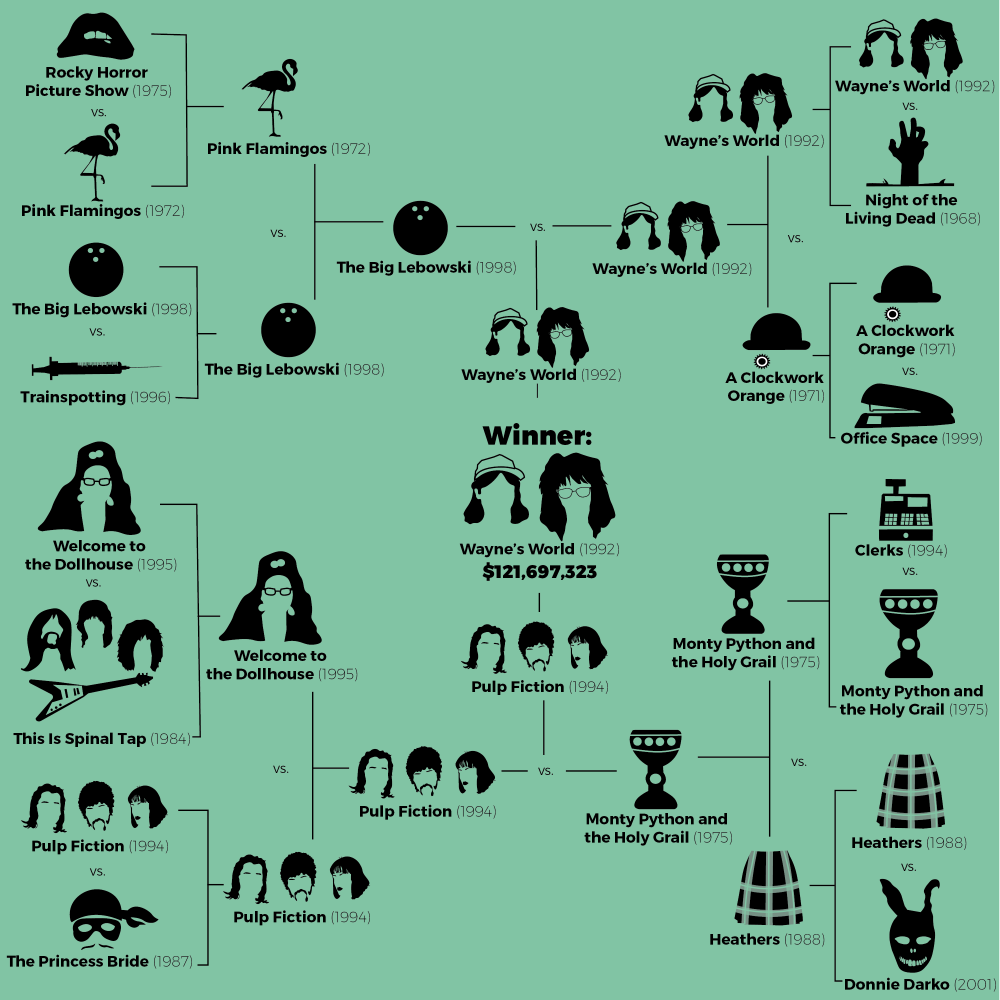Landing Page
Special Projects
This story is part of a series of specially designed stories that represents some of the best journalism The Post has to offer. Check out the rest of the special projects here.


RILEE LOCKHART
01.31.18
The first time Ethan Samuel watched Office Space was several years ago with his family.
Office Space has an iconic scene involving a red stapler and signature characters, including a greedy boss. Those attributes contribute to the fun feel of watching movies like Office Space, Samuel, a junior studying communication studies, said.
Samuel has also seen movies like Pulp Fiction, Wayne’s World and Monty Python and the Holy Grail. Though those movies all fall under different subgenres of film, they are all considered cult classics.
In cinema, a cult classic is defined as a movie that is popular among a group of people or section of society.
“It tends to be a movie that’s a little out there, more of an art film or something that is just bizarre,” Alexandra Kamody, the director of The Athena Cinema, said.
Despite not being universally liked by everyone, cult classics hold their own in the cinematic world with their off-kilter visuals and atypical storylines that attract people who can relate to them.
The term cult classic was coined in 1970 when more obscure films like The Rocky Horror Picture Show and Pink Flamingos came to the forefront. Those movies did not do well in their first run, but they surged in theaters that screened underground movies for months on end.
With midnight movies shown on TV programming, films from the 1930s resurfaced and were labeled as cult classics, including the 1932 film Freaks and 1936’s Reefer Madness.
One of the more popular cult classics is Quentin Tarantino's Pulp Fiction, and it has been widely debated whether the film should be considered a cult classic because of its commercial success. In 1994, the film grossed more than $100 million at the box office and had an estimated budget of $8 million.
Then there are movies like Richard Kelly’s 2001 film Donnie Darko, which had a budget of $4.5 million and made just $500,000.
“If you are growing up and you feel on the outskirts of the mainstream society in anyway, you don’t necessarily see a lot of that reflected in the Hollywood movies.”Alexandra Kamody, director of The Athena Cinema
Liv Lewis, a freshman studying business law, watched Donnie Darko for the first time during her freshman year of high school. She clicked on a streaming site to watch the movie because she was bored and it starred one of her favorite actors, Jake Gyllenhaal.
Lewis thought the movie was good, but it wasn’t her favorite. One aspect of the movie that made it seem obscure was the “eerie” feeling.
“It wasn’t as happy as I wanted it to be,” Lewis said.
One aspect that connects people to the more obscure films is the “communal” viewing experience, Kamody said. When people see a cult classic for the first time, it is often with a group of friends.
The Athena, 20 S. Court St., screens cult classics often. It showed a series of film all dedicated to the genre and also shows them for Ohio University special weekends. Kamody’s favorites include Wayne’s World and The Big Lebowski.
What really sets cult classics apart are the subject matters. Kamody said cult classics are outside of the mainstream movies someone would see from a studio like Marvel and Disney, and they celebrate what is different.
“It’s kind of celebrating the quirky and the different. It’s just all about something outside of the mainstream.” Kamody said. “If you are growing up and you feel on the outskirts of the mainstream society in anyway, you don’t necessarily see a lot of that reflected in the Hollywood movies.”
Online forums have made cases for different movies and how they could become the next films to be considered cult classics. Some titles include Wet Hot American Summer, Napoleon Dynamite, Spring Breakers and Pineapple Express.
Kamody thinks the recent Oscar-nominated film The Shape of Water could become one of those films. Guillermo Del Toro’s fantasy movie follows a deaf woman who falls in love with a amphibious creature being held at a government facility during the Soviet Era.
Elements of fantasy and sci-fi are not the first components that come to mind when considering cult classics, but Kamody said it is part of it whether people realize it or not.
Scott Martin, a junior study communication studies, said the 2001 comedy Super Troopers could also become a cult classic because of its characters and the fact it does not appeal to everyone.
Cult classics will always be watched, Martin said, because of their ever-evolving themes and soon-to-be nostalgic tones.
“It’s not like going to see the new Avengers movie,” Martin said. “(Cult classics are) good, and it’s something to talk about.”

Rilee Lockhart | ILLUSTRATION
Landing Page
This story is part of a series of specially designed stories that represents some of the best journalism The Post has to offer. Check out the rest of the special projects here.